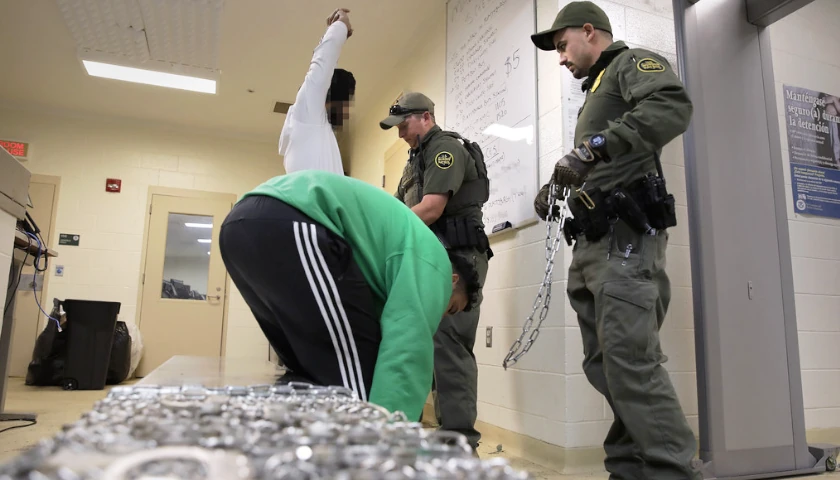by Bruce Bawer
In 1983, having spent four years earning a PhD in English, I instantly turned down the reasonably secure entry-level faculty position my alma mater offered me and chose instead to sign up for that most financially insecure of all professions: freelance literary journalist. Why? Partly because it had taken me that long to face the fact that I just wasn’t the academic type. And partly because I saw that the kind of jargon-heavy approaches that were taking over America’s English departments — from politics-driven “feminist criticism” to pretentious postmodern “deconstruction,” straight out of France by way of Yale University — had nothing whatsoever to do with my own reasons for wanting to spend my life reading and writing about books.
In the years that followed, I often found myself sighing with relief at my narrow escape from the ivory tower. For, as time went by, the humanities fell increasingly under the thumb of leftist radicals who were preoccupied with the phenomenon of social and cultural power, who inflexibly depicted Westerners (Americans especially) as imperialist oppressors and non-Westerners as victims, who replaced real liberal education (that is, the development of critical thinking) with outright Marxist indoctrination, and who even played the tiresome game of questioning reality itself. In the new humanities disciplines, the focus was more and more on identity groups — notably women, blacks, Latinos, and “queers” — who, cast in the role of perennial underdogs, became the subjects of grievance studies whose practitioners didn’t perform potentially useful scholarly research into those groups’ histories and cultures but instead endlessly pondered, professed, and protested their purported oppression.
In my 2012 book The Victims’ Revolution (TVR) — in preparation for which I interviewed some of the leading figures of this movement, sat in on college classes, read shelves full of turgid tomes, and attended academic conferences in cities ranging from Berlin to Baton Rouge to Berkeley — I provided an overview of several of these “identity studies.” I told the story of women’s studies, one of whose founding figures, the Marxist writer Betty Friedan, depicted the 1950s suburban American kitchen (which at that time was nothing less than a dreamscape for most women around the world) as a gulag; black studies, which was founded by race hustlers, many of them semiliterate thugs, after university administrators surrendered to violent rioters (including Black Panthers); and queer studies, which has nothing whatsoever to do with homosexuality but is, rather, in the words of queer academic David M. Halperin, a celebration of “whatever is at odds with the normal, the legitimate, the dominant” — or, more correctly, a self-celebration by privileged professors who, while being viewed as ornaments of the educational establishment, pretend to be at odds with the established order. (As if to prove this fact, the founding mother of queer studies, Eve Kosofsky Sedgwick, was a monogamous, heterosexual Jewish housewife who spent her career holding elite faculty positions at, in turn, the University of California, Berkeley; Dartmouth College; Duke University; and the City University of New York.)
TVR has just been issued in paperback with a new foreword by the UK Spectator’s Douglas Murray and a new introduction in which I discuss some of the ways in which these identity studies’ guiding dogmas have, since the book’s original publication, spread out into society at large. For example, the abominations known as critical race theory and “anti-racism,” which in recent years have infected primary school classrooms and corporate boardrooms alike, had their genesis in black studies; the widespread demonization of men — including the stereotype of all men as rapists, which dominated the #MeToo movement at its most extreme — is rooted in women’s studies; and the sheer fantasies that make up transgender ideology — and that have also become an orthodoxy in any number of established institutions — can be traced directly to the reality-defying notions of gender identity that are preached in the classrooms of queer studies.
Unfortunately, when writing this new introduction, I wasn’t able to retrace my steps and see how the landscape has changed; that would’ve been a prohibitively expensive proposition, and even in the waning days of the pandemic, it would’ve been exceedingly tricky in terms of travel. But thanks in large part to that same pandemic, the last few years have resulted in a small archive of online lectures, discussions, and conference sessions that provide a pretty clear picture of what’s happened to identity studies since I was researching TVR all those years ago. Herewith, a brief report.
In TVR, I observed that women’s studies, the largest of all the identity studies (which often goes by women’s and gender studies), had over the years become increasingly preoccupied with other identity categories, race above all. That this remains the case was made instantly clear by the poster for last November’s annual conference of the National Women’s Studies Association, which took as its theme “Killing Rage: Resistance on the Other Side of Freedom”; drawn in a kind of pseudo-primitive African style, the poster depicted two black women in African-looking garb. The theme of the forthcoming October 2023 conference is “A Luta Continua/The Struggle Continues: Resistance, Resilience, Resurgence.” A luta continua, as it happens, was the founding motto of Mozambique’s Frelimo party, whose war for independence from Portugal (1964–75) enjoyed the support of both China and the Soviet Union. (One wonders how many of the white feminists who founded women’s studies ever imagined that their discipline, which at its birth was preoccupied with liberating middle-class housewives from their dreaded kitchens, would end up in the hands of tenured women who, living in leafy American college towns, get a kick out of the illusion that their jargon-drenched scribblings have some connection to mid-twentieth-century communist revolutions in Africa.)
As for queer studies — whose first practitioners legitimized their Marxist enterprise by pretending that the discipline was centered on the study of homosexual life and culture — it has less to do with gay men and lesbians than ever before: to peruse the titles of the papers delivered at last year’s Queer History Conference at San Francisco State University is to encounter one opus after another on transgenderism, “female sexuality,” “queers of color,” or — especially — “queer” life south of the border. Moreover, given that in the last few years many primary school teachers have been introducing their pupils to gender fluidity and storytellers in full drag regalia, it’s not surprising that one of the conference sessions was entirely devoid to the apparently noble effort “to make queer histories more visible” in “K–12” spaces. Also — and I may be wrong here — the description of another session, “Regulating Sex Between Men and Boys in the Anglophone World, 1840s-1910s,” certainly makes it sound as if the participants were engaged in a defense of pedophilia.
As part of my research for TVR, I attended a 2011 presentation at a queer studies conference in Berlin by Susan Stryker, a star transgender professor then teaching at Indiana University who told us that one welcome, if imperfect, solution to the problem of US “neoliberalism” would be a pragmatic alliance between the intellectual Left and the “fascist” Tea Party movement. As I stated in TVR, Stryker plainly didn’t grasp what it meant to stand in a lecture hall on the Unter den Linden, a short distance from the Brandenburg Gate, and speak blithely about allying with fascists. Appearing a few months ago at a “queer history” conference in Bergen, Norway, Stryker, now “Professor Emerita” at the University of Arizona, was still at war with “neofascists” — who, in the 1970s, we were told, sparked local resistance by turning slum housing and community facilities in the “old trans sex work ghetto” in San Francisco’s Tenderloin into upmarket apartments.
Stryker described the Tenderloin of that era as a “carceral” environment — a “place of confinement for criminalized populations.” In Bergen, just as in Berlin, Stryker — who proceeded to rail against police and prisons generally — seemed deaf to context: whereas many of the misfits who found a home in the Tenderloin half a century ago doubtless saw it not as a penitentiary but as a place of freedom, Stryker was speaking a short distance from the Skrekkens hus (house of horrors), from which the Gestapo, during the five-year Nazi occupation of Norway, ruled brutally over a city that really was a “carceral” environment. Furthermore, the terrible reality of what “defunding the police” has meant for the once-lovely City by the Bay made Stryker’s antiprison bombast seem especially blinkered.
Indeed, Stryker came off as utterly irresponsible. But then again, none of these identity studies pros are interested in discussing human identity in a remotely mature and responsible way. They’re no more interested in formulating sensible ideas for the future than they are in owning up to past views that have proven fallacious. Their “work,” far from having the remotest relevance to the realities of anyone’s lives, is about the endless mouthing of reality-defying woke bromides as if they were professional mantras; hence, Stryker’s Bergen talk concluded with a banal windup to the effect that the “militant trans resistance” in yesterday’s Tenderloin can help us “imagine what can transpire” there in the future — even though that “resistance” did nothing whatsoever to change that hellhole of a neighborhood for the better.
In Bergen last year, as in Berlin eleven years earlier, Stryker spoke at a queer studies conclave. One of the major changes in identity studies during the last decade, however, has been the massive increase in courses and conferences exclusively, or principally, devoted to trans studies, a field that, at the time I wrote TVR, didn’t even merit inclusion in my chapter on small up-and-coming disciplines. “The State of Trans Studies in the 2020s,” a 2021 online discussion sponsored by units of the University of Massachusetts and Clark University and featuring six contributors to the new SAGE Encyclopedia of Trans Studies, proved illuminating on this front. Asked what questions are guiding his own present journey through trans studies, Marquis Bey (“they/them”) of Northwestern University replied — and okay, hold on to your hats, for here comes the obligatory dose of identity studies patois — that he’s currently preoccupied with
the question of materiality: what does it mean to have, be, a certain kind of body, and how do we assess and think about what it means to be certain kinds of, in particular, gendered subjects, and for me that’s rendered as a question because it seems to me that the very notion of materiality, the very notion of embodiment, by way of trans studies and by way of trans analytic, is being thrown into a kind of crisis of questioning. So how then can we think about reconfiguring, reimagining, maybe even abolishing various tenets on which the body rests? And that to me is incredibly exciting, also incredibly terrifying too, precisely because if one of the things that situates us in space, situates us in relation to other people, is the purported facticity of the body, to throw that into question is then to throw into question our very status as subjects in relation to other people. But I do think genuinely that that throwing into crisis implies or looks toward a different modality of being and relating to one another on grounds that are not constituted by the normative, constituted by violence, constituted by all these various kinds of hegemonic identities that are imposed upon us, so how can we then think about materiality and subjectivity and embodiment, et cetera, otherwise?
I quote this passage in full to demonstrate that, whatever else may or may not have changed in identity studies, the tendency of its practitioners to serve up staggering amounts of pretentious rhetoric conveying little or nothing in the way of substance is alive and well. Bey’s main point here, you may have gathered, is that if you buy into the premise of transgender theory — namely, that simply saying you’re a female overrides the testimony to the contrary of every cell in your body — it’s only natural to follow up on this act of faith by questioning the importance, and even the reality, of the physical self. I noticed that Bey wasn’t the only member of the panel who was preoccupied with the issue of “materiality” — which was interesting because, if you decide that you don’t really exist, then where does the university mail your check?
Checking out Bey’s website, I found that if, on the one hand, he’s playing the game of questioning his own existence, on the other hand — as I discovered on his website — in his “field-defining academic monograph,” Black Trans Feminism, he imagines himself as a veritable Genghis Khan of identity politics, engaged in “a wholesale dismantling of the world we have been given.” Yes, a wholesale dismantling of the world we have been given — what self-respecting identity studies scholar today would admit to a lesser goal?
The brand of numbing English that Bey churns out — a legacy of the insanely influential Judith Butler, a pioneer of queer and women’s studies who won the 1998 Bad Writing award from the journal Philosophy and Literature — is common in identity studies, but not quite ubiquitous. Those who want to be taken seriously as scholars and who therefore feel a need to pretend they’re struggling with complex ideas feel compelled to sling the recondite argot, but those who strongly identify as activists and wish to communicate with the grievance-group hoi polloi prefer to keep their language simple. So it was that in this online discussion, an older participant, Aaron Devor, chair of transgender studies at the University of Victoria in British Columbia, Canada, contended that if trans scholars “want to change the world,” they should eschew “excessive academese and jargon.” Bey didn’t look happy.
Another participant, Ann Travers of British Columbia’s Simon Fraser University, also sees it as her job to “change the world”: witness the title of her 2018 book The Trans Generation: How Trans Kids (and Their Parents) Are Creating a Gender Revolution. In Travers’s view, trans studies should be concerned less with winning acceptance for trans adults than with recruiting “trans kids” — or, if you will, rescuing them from “a constellation of interest groups with an investment in conservative heteropatriarchal gender politics, many of whom are into white-power nationalism.”
Although this online discussion was purportedly trans focused, the subject of race kept coming up. Travers bragged that whenever she runs across a trans studies book that doesn’t incorporate “a critical race perspective,” she deep-sixes it. Another participant complained that “whiteness … has robbed us of the time to develop a particular relational ethic” and that “everybody in trans studies needs to deal with their relationship to blackness.” As I noted in TVR, identity studies has become obsessed by “intersectionality” — the vapid observation that, say, a black lesbian can experience a heady cocktail of bigotry composed of racism, sexism, and homophobia — and women’s studies has been all but taken over by issues of race. Still, in these recent identity studies conferences, the degree of insistence on the need to prioritize blackness, no matter which identity category is nominally under examination, is unprecedented in my experience.
As for black studies itself, it appears — as one might expect — to be stronger than ever. In addition, the related field of whiteness studies, which I touched on briefly in TVR, has gained considerable traction, thanks in large part to bestsellers like Robin DiAngelo’s White Fragility (2018), which — either ignoring such chronic black-subculture issues as single motherhood, ghetto crime, drug gangs, and high dropout rates, or refusing to admit the slightest degree of black culpability for them — seek to blame all of black America’s problems on white racism.
What exactly is whiteness studies? As Cheryl E. Matias, author of Feeling White: Whiteness, Emotionality, and Education, explained in a 2020 talk at the University of Denver, the field teaches that whites are natural “colonizers” who wield unearned and often unconscious “power,” who feel “entitled” and instinctively behave in a “supremist” manner, and who respond to criticism of any of these defects with “emotionality.” Thanks to white power, the Western literary canon consists entirely of works by “white men,” and the black character in movies “is always the sidekick.” As you might imagine from this thumbnail description, the field’s practitioners are entirely Western-oriented (listening to them, you wonder if they’ve ever heard of the Ottoman Empire or the Empire of Japan, or if they’re aware that some national literature is actually the work of nonwhites), and they often talk as if they’re living in a pre-MLK America, where there’s never been a president named Barack Obama, a Nobel laureate named Toni Morrison, or a two-time Oscar-winner named Denzel Washington.
Matias, who made a point of specifying that she teaches “black whiteness studies” as opposed to “white privilege” pioneer Peggy McIntosh’s “white whiteness studies” — a distinction I hadn’t encountered before — parroted the familiar lie that white cops are massacring innocent blacks and condemned “the narcissism of whiteness” (although I’ve rarely, if ever, seen any professor talk as much about herself as Matias did in that presentation). Needless to say, it would be professional suicide for a white academic to generalize as crudely and negatively about black people as Matias did about whites. And what, one wonders, would happen if one of Matias’s students dared to ask her why black social pathologies persist in the US even as relatively new Asian and African immigrant communities have been models of success? No doubt the troublemaker would be reported to a dean and expelled on the spot.
Two “identity studies” that unhelpfully turn medical conditions into victim groups also continue to thrive. One is fat studies, which tells morbidly obese young people (mostly women) that they can enjoy “health at any size.” Indeed, as I wrote in TVR, fat studies argues that “encouraging people to watch their health is a coercive and potentially fascist act linked to capitalism, racism, and Nazi-style eugenics.” Last year, podcaster Steven Crowder subjected fat studies to the kind of brutal parody it deserves: in a pricelessly hilarious video, Crowder, wearing a fat suit and wig and using the pseudonym Sea Matheson, delivered, via Zoom, a deliberately ridiculous paper, “Embracing Fatness as Self-Care in the Era of Trump,” at a fat studies conference session. Not only was Crowder not fingered as a jokester and summarily ejected; the other attendees gave him “rave reviews,” and “Matheson” was invited to review a paper for a fat studies journal.
Even more unsettling than fat studies is disability (or, believe it or not, “crip”) studies, which encourages the disabled to regard their handicap as their identity — and which, therefore, views any effort to cure deafness, say, as attempted genocide. In a 2020 TEDx Talk, Noah Bukowski, who has cerebral palsy and teaches disability studies at the Ohio State University, explained that he resents being told by loved ones that he’s walking or talking better because, to him, that means he’s walking or talking “less like me.” In other words, progress in overcoming his disability amounts to “erasure of my disability.” (In disability studies, incidentally, abortion is a fraught issue: killing healthy fetuses is, of course, no problem, but terminating early-stage embryos who will have severe birth defects is deeply problematic.)
In none of the identity studies is it clearer than it is in disability studies just how wide the intellectual gap is between those frauds whose entire education consists of having memorized a handful of inane bullet points and the genuine professionals, operating far beyond the bounds of identity studies, who actually know something about the topics in which those ideologues are supposedly experts. When it comes to disability studies, for example, we have, on the one side, brilliant researchers, doctors, and surgeons who seek to free humanity from deliberating afflictions; on the other side, we have vapid careerists who come very close to demonizing those scientific professionals even as they push the grotesquely reductive proposition that, at the end of the day, you are what ails you.
And none of what the practitioners of identity studies actually do has the slightest connection to legitimate education or scholarship. Their job in the classroom is unambiguous: to fool callow young people into thinking that they’re learning something when, in fact, they’re being indoctrinated into a fatuous ideology and trained to be fanatical crusaders for socially destructive ideas. There are cosmetic differences among the various identity studies, but in every case the guiding premise is, briefly put, that America, outside of the university, is crying out for radical change because it’s organized in certain old-fashioned and deeply unjust ways that systematically privilege heterosexual white men while consistently marginalizing women, gays, “people of color,” and “gender nonconforming” persons. In fact, in the year 2023, off-campus America, at least in its leading corporate, media, religious, military, and cultural institutions, has already been transformed by a toxic revolution whose battle cries are right out of the identity studies playbook. It’s all sheer mischief, as dangerous as it is puerile; and if it isn’t rolled back soon — not just in mainstream society but also on the university and college campuses where it originated — it’ll be too late to return America to sanity, order, and individual liberty.
– – –
Bruce Bawer is the author of many books, including While Europe Slept (2006) and The Victims’ Revolution (2012). He lives in Norway.
Photo “College Classroom” by Yan Krukau.





